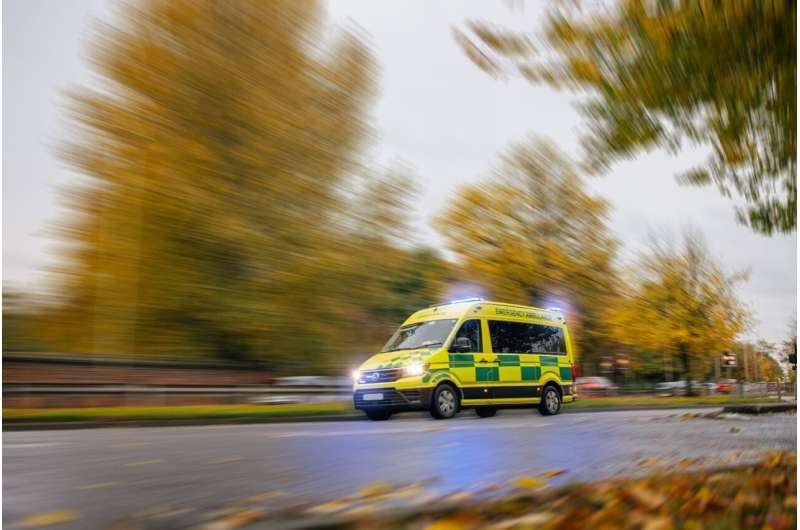This article has been reviewed according to Science X's editorial process and policies. Editors have highlighted the following attributes while ensuring the content's credibility:
fact-checked
peer-reviewed publication
reputable news agency
proofread
Amsterdam's 'psychiatric ambulance' could be advance for those in mental health crisis

Ambulances meant for people having a mental health crisis could help folks get the care they need with less confrontation and friction, a new study says.
People transported to the hospital by a "psychiatric ambulance" required fewer restraints or coercive measures than those transported by the police, according to results from an Amsterdam program.
In 2014, Amsterdam introduced a psychiatric ambulance service operated by a trained driver and a psychiatric nurse.
It looks just the same as a typical ambulance, but inside it's stripped of visible medical equipment to create a more tranquil environment. Patients can sit upright or lay on a stretcher, with a soft Velcro restraint or sedative medication available as needed.
Researchers compared nearly 500 police transports in the four months prior to introduction of the psychiatric ambulance, and more than 650 ambulance transports that occurred within six months after the service started.
They found stark differences when it came to the use of restraints:
- 86% of people transported by ambulance were not restrained, compared with 57% of those transported by police.
- 42% of people transported by police were handcuffed, compared to less than 1% who went by ambulance.
However, the occurrence of aggressive events was similarly low in both the ambulance and police groups, around 2%.
The rates of hospital admission were similar between the two groups, 36% for ambulance versus 33% for police.
But significantly more admissions were voluntary in the ambulance group—39% versus 27%.
Police "usually receive limited training in managing psychiatric disorders and in responding to individuals experiencing psychiatric symptoms or crises, which may increase the risk for preventable escalation and the use of restrictive measures," said lead researcher Dr. Jeroen Zoeteman, director of treatment affairs at Emergency Psychiatry Amsterdam.
The psychiatric ambulance is one of several innovations, such as crisis intervention teams, that are designed to support police or relieve them of the burden of transporting patients in the throes of a mental health emergency, researchers noted.
Crisis intervention teams (CIT) have been successful in reducing the use of force or coercion in the United States, but patients still are sometimes handcuffed or restrained during police transport to a hospital, researchers said.
The new study was published May 29 in the journal Psychiatric Services.
"Shifting to an ambulance system to transport persons in a mental health crisis could also improve care in communities in which the CIT model is active," the researchers concluded in a journal news release.
More information: Jeroen B. Zoeteman et al, Coercion During Psychiatric Ambulance Versus Police Transport in Mental Health Crises: A Pre- and Postimplementation Study, Psychiatric Services (2024). DOI: 10.1176/appi.ps.20230571
The National Alliance on Mental Illness has more about crisis intervention teams.
© 2024 HealthDay. All rights reserved.



















